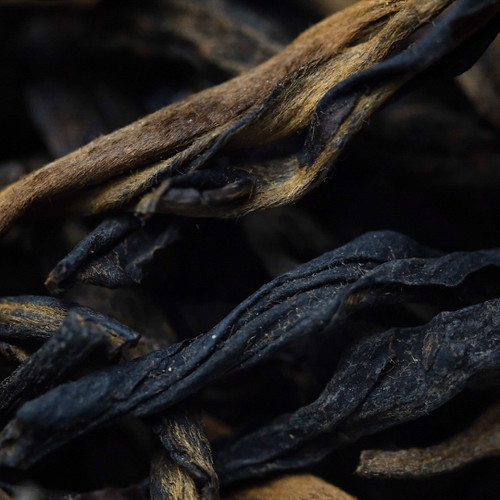2000-03 Ling Ling (零零陳生茶, Líng Líng Chén Shēng Chá, "Zero Zero Old Sheng Tea") is composed of the tail ends of four years of Sheng Pu'er batches. When a batch of tea gets to the very end, the quantity becomes too small to sell as a single batch for wholesale. Sometimes tea farmers will consolidate the tail ends from many years to create a larger quantity of blended tea. This is the case with Líng Líng, which gets its name from the Chinese for "Zero Zero," which is shorthand for the year 2000. The oldest batch within this blend comes from the year 2000, which is the first year that Li Shulin began growing and processing his own tea after leaving his job at the Dayi Tea Factory (previously the Menghai Tea Factory), where he worked for 30 years. Because he didn't save any pure batches from those years, this is the oldest Sheng Pu'er available from this farm. The blending of multiple years gives it a smooth, rounded profile. Aged loose, as opposed to pressed, this tea has acquired a distinctly fermented taste. Teas aged in a dry climate, such as in Yunnan, are referred to as gàn cāng 幹倉 ("dry-stored"), as opposed to the wet-aged style found in places like Hong Kong and Guangzhou, which have high humidity. This tea's 16-20 years of age have mellowed the sharp notes of fresh Sheng Pu'er, while retaining the complexity that is often lost during the Wò Duī 渥堆 (“Moistening and Piling”) or smaller scale Xiǎo Duī Zi 小堆子 (“Small Pile”) fermentation processing. The result is an aged Sheng with a clean, crisp, smooth flavor wherein the floral fragrances of fresh Sheng have been transmuted into a woody and earthy bouquet.
1 Review
-
Second steep, brewed at around 192 F. Delicate, sweet, light textured, but there's something substantial there. Lingering cool spearmint sensation in the mouth and throat, and noticeable salivation. Huigan is not something I typically pay much mind to, especially as it seems associated with younger shengs, but it's pronounced in this tea, leaving a juicy feeling in my mouth. Going to hit the third and fourth steeps with 200 F water... So, this tea is a creeper. There's very little flavor up front on the first sip. But then this big minty tsunami of flavor rolls in from the front of the mouth to the back of the throat and into the nasal cavities, and just keeps building. Plus, I think I'm more or less tea drunk on the third steep. These aren't the characteristics I'm typically looking for in an tea, although I think it's exactly what a lot of more experienced gong fu cha devotees are looking for, and I get how seductive it is. Saturating kougan, pronounced huigan, strong, clear-headed, uplifting chaqi. Quite intoxicating.


